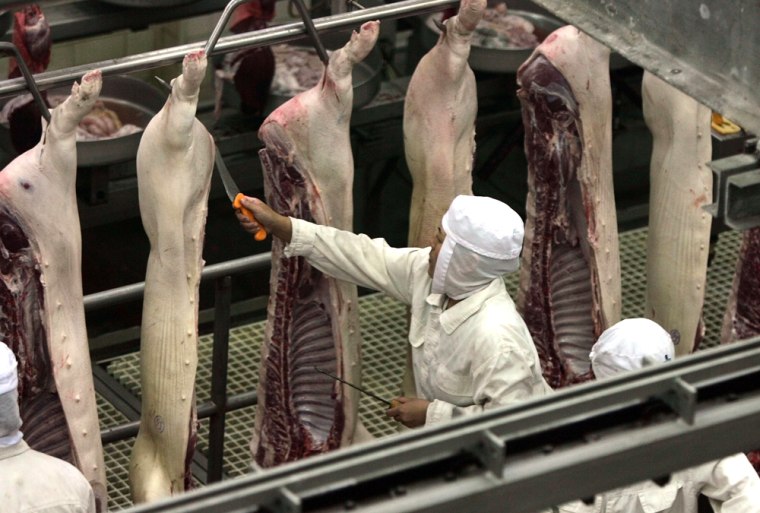Last August, the Chinese government unleashed its most extensive campaign since the 2002-03 outbreak of SARS, the mysterious killer disease. The goal: to shore up China's battered reputation as a manufacturer of quality goods.
As the four-month initiative — part crackdown, part public relations drive — ended in December, experts say China has taken significant steps toward addressing product quality and safety problems. But they also note the risk of backsliding in a country with a convoluted bureaucracy and a well-documented history of local leaders ignoring edicts from the top.
"The events of the past six or so months do represent a watershed," said Robert Kapp, a business consultant who headed the U.S. China Business Council from 1994 to 2004. "But watersheds are not always forever."
"The problem may be very systematic by now, and I don't know if the Chinese will overcome it," he added.
While the high-profile campaign is over, the government is continuing work on several fronts, including developing China's first-ever food safety law.
The country's reputation as an export power took a beating last year. In March, dog and cat deaths in North America were linked to a Chinese-made pet food ingredient. Then came reports of potentially dangerous frozen fish, juice, tires and toothpaste. Millions of toys were recalled in several countries over lead paint and other fears.
The crisis put China's position as the world's factory at risk, threatening the underpinning of its economic success and the jobs that are lifting millions of Chinese out of poverty.
The furor also brought China's long-running domestic food safety problems to light, just as Beijing prepares to host hundreds of thousands of foreign visitors at the Summer Olympics in August.

The seriousness with which the government took the issue was underscored by the appointment of its top problem solver, Vice Premier Wu Yi, to head a Cabinet-level panel overseeing the campaign.
Wu, a stern-looking 69-year-old known as the "Iron Lady," shepherded China's difficult entry into the World Trade Organization, took over as health minister during the SARS epidemic and has been tasked with handling the vociferous U.S. complaints about China's exchange rate policy.
One month into the product safety campaign, Wu herself set out to randomly inspect shops and restaurants in the eastern province of Zhejiang. She had no itinerary and told no one in advance, making the driver stop at her whim.
In the sticky September heat, Wu examined business licenses and employee health certificates at a two-table dumpling eatery, scrutinizing the kitchen and refrigerator to see if ingredients were fresh. She gave it her seal of approval.
At her next stop, she condemned a chain restaurant for not having the required employee health certificates.
A senior official who accompanied Wu described the trip to foreign reporters in October as part of the public relations effort.
"If China's leaders pay this much attention to the quality of products ... we can achieve the goals we are trying to reach by the end of the year," Li Changjiang told the journalists.
Wu declared the campaign a "special war to uphold the health, life and interests of the people and uphold the reputation of Chinese products and its national image."
Thousands of unlicensed manufacturers were shut down. Teams of inspectors were dispatched, and labels showing that the quality of export food products had been checked became mandatory.
Rigorous inspections delayed toy shipments. "Many of our shipping containers were stuck from the end of August to the end of September, even until the beginning of October," said Yu Linhan, a sales representative for Zhejiang Ruyi Industry Co., which makes brightly painted wooden figurines sold in Europe.
State television broadcast a weeklong series defending Chinese goods; the inaugural 90-minute program was titled "Believe in Made in China."
The food safety law would tighten import and export standards; require product labels that include ingredients, additives and expiration dates; and call for the establishment of a food recall system, according to the official Xinhua News Agency.
Producers and dealers of food containing banned or dangerous substances would be "severely punished" under the proposed law, Xinhua said. Likewise for food safety officials who fail to do their jobs. No details on the proposed punishments have been disclosed.
The government has also engaged Western experts in crisis management. In September, Ogilvy Public Relations Worldwide trained 100 representatives from provincial offices of the State Food and Drug Administration. At the height of the scandals in July, the former head of the agency was executed for taking bribes to approve substandard medicines.
"There's an evolution taking place," said Scott Kronick, president of Ogilvy's China operations. "I've seen a marked change in their ... openness for advice."
At the training, Kronick hammered home the need to be prepared and open to questions, showing participants editorial cartoons and press clippings to illustrate how the world perceives China.
"They recognize that not everything has to be rosy," he said. "They're getting more comfortable with not having all good news to report."
One of the biggest challenges China faces is getting local authorities to enforce regulations amid shortages of technical equipment and manpower, said Helen H. Jensen, an economics professor at Iowa State University.
China also lacks traditional consumer watchdogs such as a free media and independent civic groups.
Julie Livingston of the New York-based Toy Industry Association, which represents about 500 toy companies, said the jury is still out.
"The damage done to the reputation of toys made in China has been immense and it will take time to turn around," she said. "It will require a continuous effort by the Chinese government, and by the toy industries in both countries, to rescue China's tattered toy reputation."